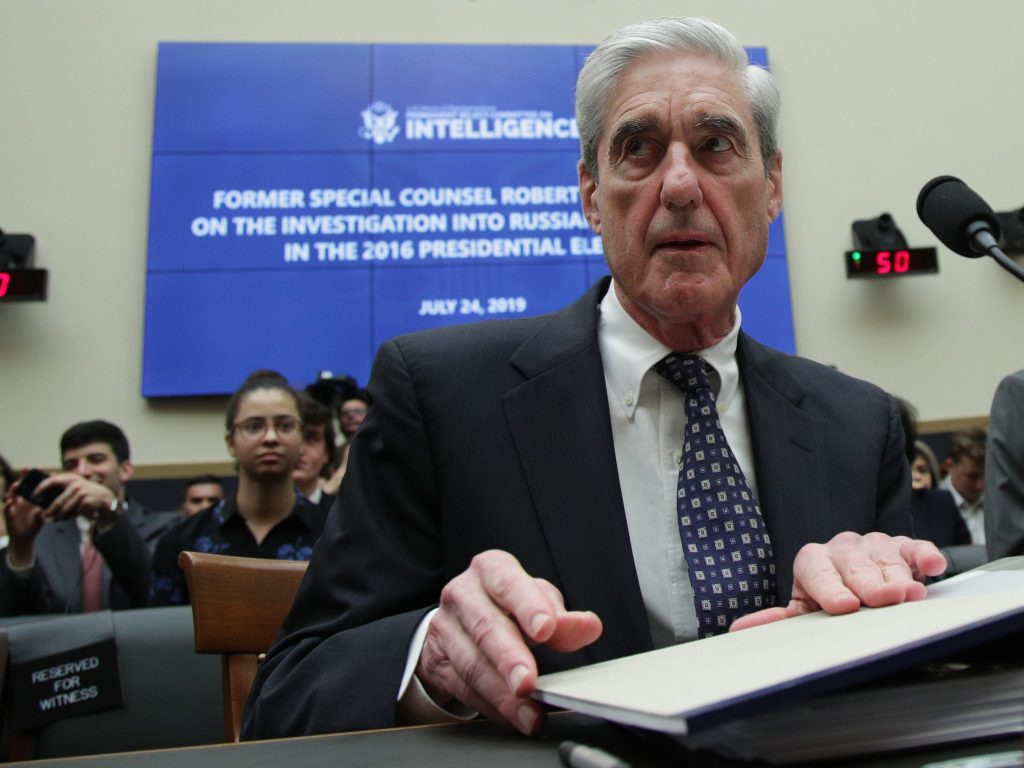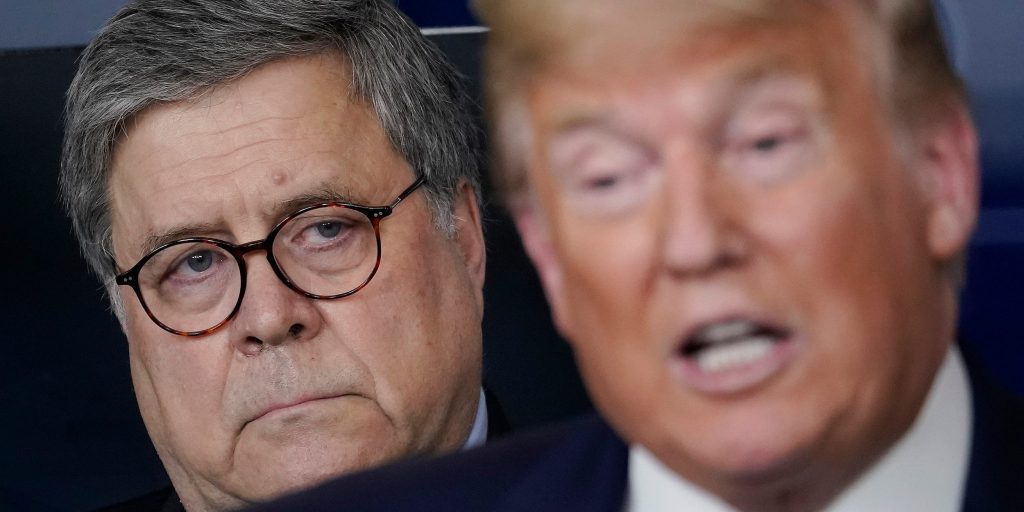- The Justice Department released a once-secret memo arguing against charging Trump with obstruction.
- The memo was publicized after a federal appeals court panel unanimously ruled for its release.
- The memo urged DOJ to "reach a judgment" on whether Trump obstructed the Russia investigation.
The Justice Department on Wednesday released a once-secret 2019 memo that recommended against charging then-President Donald Trump with obstruction of justice in connection with special counsel Robert Mueller's investigation of Russia's interference in the 2016 election.
The 9-page memo's release, in response to a court order, sheds additional light on one of the most climatic and controversial moments of the Trump presidency: whether he should face a federal indictment for trying to stop the Mueller probe itself.
In their preparation of the 2019 memo, a pair of top Trump-appointed Justice Department officials relied on a more than 400-page report in which Mueller summarized the findings of his special counsel team's investigation. At the time, the Justice Department had not yet released the Mueller report, which was divided into two volumes — the first involving the inquiry into Russia's interference, the second concerning whether Trump illegally sought to obstruct the investigation itself.
Referring to that second volume, top Justice Department officials Steven Engel and Edward O'Callaghan wrote in their memo that the evidence "is not, in our judgment, sufficient to support a conclusion beyond a reasonable doubt that the President violated the obstruction-of-justice statutes." Engel authored the memo as head of the Justice Department's Office of Legal Counsel, a unit tasked with weighing some of the thorniest legal questions faced by the executive branch.
The OLC memo went on to say the special counsel's report did not identify actions on Trump's part that, in their office's view, "constituted obstructive acts, done with a nexus to a pending proceeding, with the corrupt intent necessary to warrant prosecution" for obstruction of justice.
In urging then-Attorney General William Barr not to prosecute Trump for obstruction, the memo said that "there is no precedent for an obstruction case on similar facts."
"Of course, any investigation concerning the President would be exceptional, but the President is hardly the only public official who could be subject to investigation," the memo said.
It added that Mueller's findings in the obstruction inquiry were both "novel" and "unusual" because, in the OLC's view, the special counsel's team did not find "sufficient" evidence to charge anyone associated with the Trump campaign with conspiring with the Russian government to interfere in the 2016 election.
"Given that conclusion, the evidence does not establish a crime or criminal conspiracy involving" Trump "toward which any obstruction or attempted obstruction by the President was directed," the memo said.

Mueller's team ultimately issued a 448-page report summing up its findings in the years-long investigation into Russia's election interference.
It spelled out 10 instances in which Trump potentially obstructed justice in the course of the inquiry, including the firing of then-FBI Director James Comey in 2017 and attempts to have Mueller fired as well. But the special counsel declined to make a "traditional prosecutorial judgment," citing a 1973 Justice Department policy that dated back to Richard Nixon and the Watergate scandal that sided against indicting a sitting president.
When Barr held a news conference shortly before a redacted version of Mueller's report was released in 2019, he told reporters that the special counsel's decision was not influenced by the longstanding department policy. He said that in fact, Mueller's determination — or lack thereof — was prompted by the inconclusive nature of the evidence.
But in his report, Mueller did not cite the nature of, or lack of, evidence as a reason he did not come to a decision on obstruction. He did, however, cite 1973 against charging a sitting president.
Mueller's team said that "if we had confidence after a thorough investigation of the facts that the President clearly did not commit obstruction of justice, we would so state." The team continued: "Based on the facts and the applicable legal standards, however, we are unable to reach that judgment."
Wednesday's release of the DOJ memo punctuated a years-long court fight in which a watchdog group, Citizens for Responsibility and Ethics in Washington, pressed for a copy of the official Justice Department guidance underlying the decision not to charge Trump with obstruction.
A federal appeals court panel ordered the memo's release last week, siding with a trial judge who had previously ruled that the Justice Department should make the document public.
The three-judge panel of the US Court of Appeals for the DC Circuit, in a unanimous decision, rejected the Justice Department's arguments that the memo was protected from public release by the so-called deliberative process privilege, which shields details about government decision-making from public disclosure. Writing for the DC Circuit panel, Chief Judge Sri Srinivasan found that Barr never seriously considered charging Trump with obstruction, writing that the OLC review amounted to an "academic exercise" and a "thought experiment."
The decision echoed a 2021 ruling from Judge Amy Berman Jackson, who accused Barr of being "disingenuous" in his initial public description of Mueller's findings. Ordering the memo's release, Jackson, an Obama appointee, also determined that the Justice Department lacked candor with the court in its descriptions of the role and purpose of the 2019 memo prepared by the Office of Legal Counsel.
"The review of the document reveals that the Attorney General was not then engaged in making a decision about whether the President should be charged with obstruction of justice; the fact that he would not be prosecuted was a given," she wrote.
